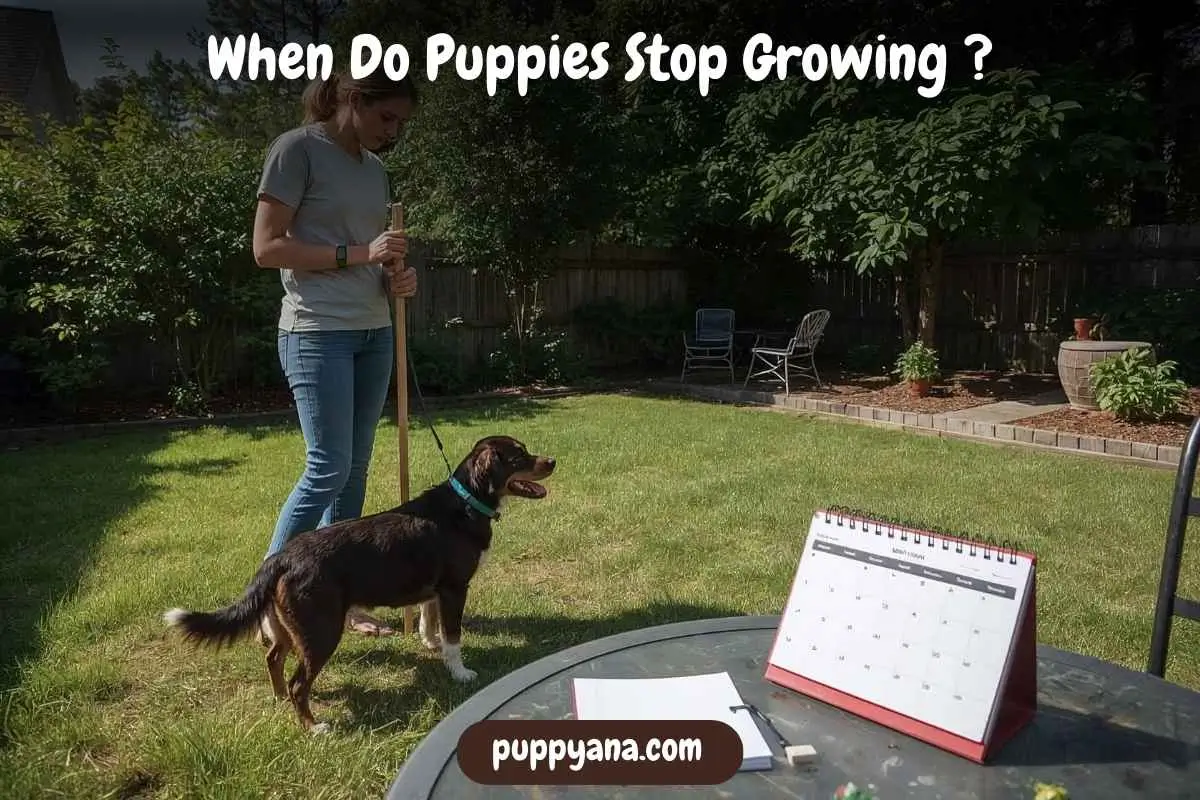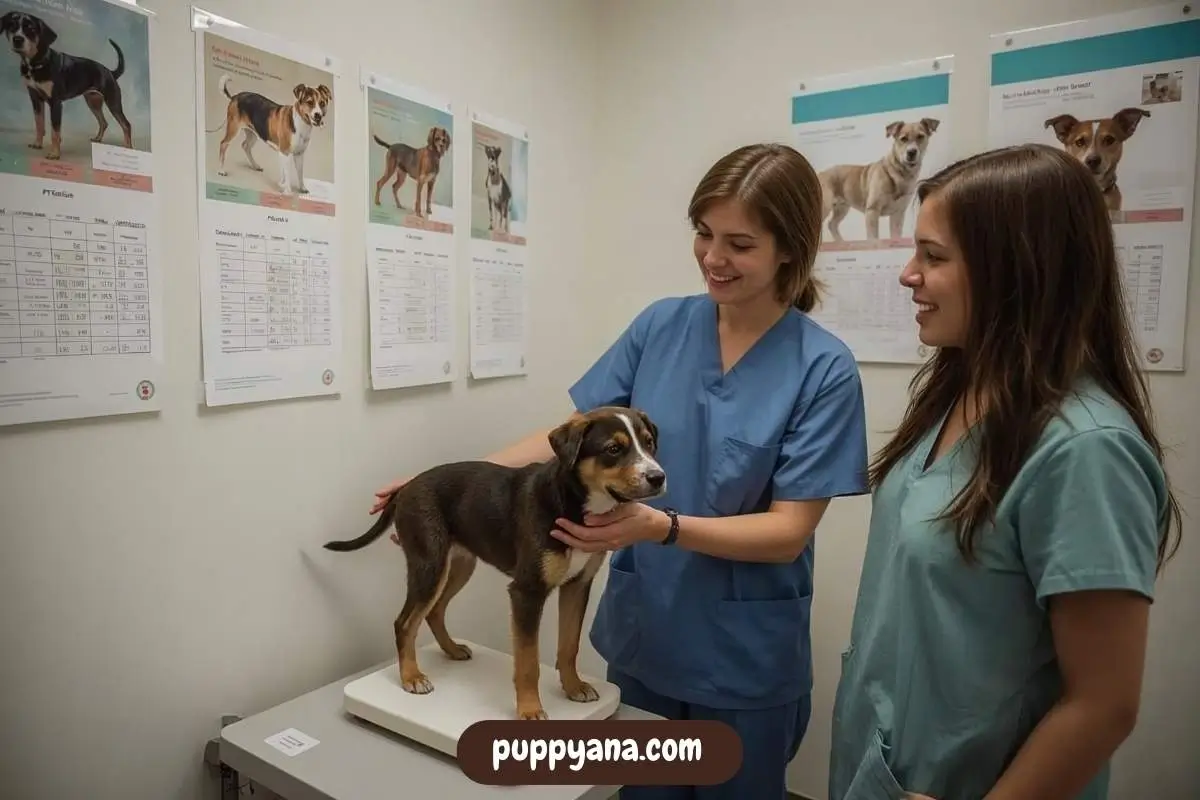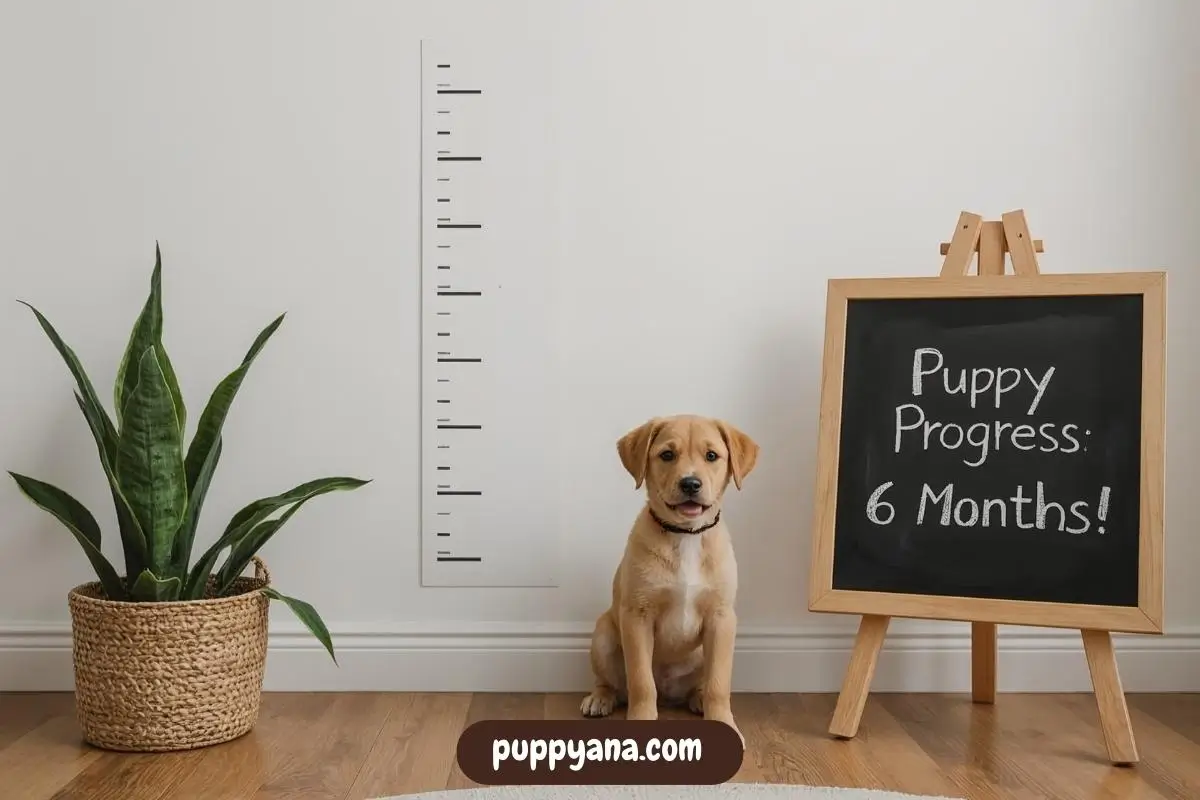You’ve watched your puppy grow from a tiny fluff ball into a bigger, bouncier version of themselves. But at some point, you start to wonder, when do puppies stop growing?
The truth is: it depends! Breed, size, genetics, diet, and even spay/neuter status can all affect how long your dog keeps growing.
In this helpful guide, we’ll cover:
- Growth timelines by breed
- Signs your puppy is finishing a growth stage
- What can speed up or slow down growth
- Health tips to support your growing pup
Let’s take the mystery out of your dog’s development and help you prepare for every stage.

Table of Contents
ToggleWhen Do Puppies Stop Growing?
Most puppies reach their full height and weight between 6 to 24 months, with smaller breeds maturing earlier and larger breeds taking much longer.
General growth timelines:
- Small breeds: 8–12 months
- Medium breeds: 10–14 months
- Large breeds: 12–18 months
- Giant breeds: 18–24 months
According to AKC’s puppy growth chart, your dog’s bones continue to develop even after they’ve stopped looking “puppy-sized.”
So while they may look fully grown at 1 year, there’s still a lot happening under the surface.
Breed Size and Growth Milestones
Breed size is one of the biggest predictors of how fast and how long your puppy will grow.
Breed size breakdown:
| Breed Size | Growth Complete By | Common Examples |
|---|---|---|
| Toy | 6–9 months | Chihuahua, Yorkie |
| Small | 8–12 months | Beagle, Shih Tzu |
| Medium | 10–14 months | Border Collie, Aussie |
| Large | 12–18 months | Golden Retriever, Boxer |
| Giant | 18–24 months | Great Dane, Mastiff |
Note that giant breeds grow slower to protect their developing bones and joints, which also makes nutrition even more important.
When Do Puppies Stop Growing Compared to Their Littermates?
Even among pups that are the same size and same breed, growth can vary, especially between males and females or pups with different temperaments.
If you’re asking when do puppies stop growing compared to their littermates, the answer largely depends on:
- Position in the litter (runt vs. dominant)
- Feeding schedule during weaning
- Hormones (especially after spaying/neutering)
- Growth rate set by genetics
Key things to consider:
- The runt of the litter isn’t necessarily “stunted”—they might just take longer to catch up
- A “bigger brother” littermate may reach full size faster, not bigger
- All puppies mature at slightly different rates—even full siblings
Tracking each pup’s weight individually is the best way to spot true growth delay versus natural variation.
We often remind new pet parents not to compare too quickly. Individual timelines matter more than breed averages.
How to Tell If Your Puppy Has Stopped Growing
Even without exact charts, you can look for these signs that your puppy is nearly done growing:
Growth Completion Signs:
- Legs and paws seem proportionate to the body
- Appetite levels stabilize
- Their energy shifts to endurance vs. bursts
- Permanent teeth are fully in
- Your vet confirms growth plates are closed (via X-ray)
If you’re still wondering when do puppies stop growing, your vet can offer the most accurate info during wellness checks based on bone formation and physical maturity.
What Affects How Fast (or Slow) a Puppy Grows?
Growth isn’t all about breed, it’s also about lifestyle, care, and genes. Here are the main factors:
Key Influencers:
- Genetics – inherited size baseline
- Diet and nutrition – poor food can stunt growth or cause rapid gain
- Neutering/spaying – early procedures may delay bone growth plate closing
- Health status – illnesses, parasites, or injuries can interrupt progress
- Activity levels – play builds strong bones and lean mass
According to PetMD’s guide on canine growth, well-fed, well-exercised puppies reach size milestones more consistently but not faster.

Do Mixed Breed Puppies Grow Differently Than Purebreds?
Yes, mixed-breed puppies can have less predictable growth patterns compared to purebreds, because their genetic history varies.
If you’re asking when do puppies stop growing in mixed breed dogs, the timeline depends on:
- Dominant breed traits (especially size)
- Whether they take after a large or small parent
- The presence of giant breed genes, which can extend growth periods
- Breed mix health needs (e.g. hip development, weight loading)
Mixed breed growth tips:
- Track weight and height monthly from 8 weeks
- Use feeding guidelines based on expected adult weight
- Ask your vet to help estimate the final size based on joints and puppy teeth development
- Use DNA testing (e.g. Embark, Wisdom Panel) to uncover growth-influencing ancestry
We recommend growth logging apps or charts when raising mixed-breed puppies, so pet parents know what to expect and how to support growth safely.
When Do Puppy Bones Fully Develop?
Your puppy may appear grown, but their skeleton is still forming.
Most dogs’ bones finish developing when their growth plates close:
- Small breeds: around 10–12 months
- Large breeds: up to 18–24 months
Until then:
- Avoid high-impact activities (e.g., stair running, jumping off furniture)
- Use age-appropriate play
- Choose controlled walks vs. heavy exercise
According to VCA Hospitals, overworking growing bodies can lead to bone deformity, especially in giant breeds.
When Do Puppies Stop Growing in Height vs Weight?
Growth happens in phases, and sometimes your pup stops gaining height, but keeps filling out in muscle and bulk.
So, when do puppies stop growing in height, and how is it different from weight?
General guidelines:
- Height usually finishes first: around 6–12 months
- Weight stabilizes later: often around 12–18 months
- Large breeds take longer to fill their frame, adding muscle after they reach full height
- Spayed or neutered dogs may carry a bit more weight after growth ends
Overfeeding during the “bulking” phase can increase fat, not healthy size, so always balance diet with age-appropriate exercise.
Does Neutering or Spaying Affect Puppy Growth?
Yes, the timing of the procedure can delay the closure of growth plates, especially in large and giant breeds.
What studies suggest:
- Early spay/neuter (before 6 months) may increase height slightly
- It can delay bone maturity, which may affect joint alignment
- Vets often recommend waiting until 9–18 months for large breeds
Always talk to your vet about timing based on your dog’s breed, size, and health goals.
How to Support a Growing Puppy
If you’re still wondering when do puppies stop growing, the better question might be: “How can I help them grow well?”
Top Growth Support Tips:
- Feed breeder-recommended food or vet-approved diet
- Use “puppy formula” food for the first 12 months
- Avoid overfeeding (especially large puppies)
- Monitor joints, weight, and posture monthly
- Don’t supplement calcium unless recommended
- Provide mild, age-appropriate exercise (daily walks + floor-play)
PuppyAna often recommends calming enrichment like food puzzles or Kong toys, which reduce anxiety while helping development.

Common Puppy Growth Myths (That Just Aren’t True)
There are plenty of rumors that confuse new dog parents. Here’s the truth.
Myth vs. Fact
| Myth | Reality |
|---|---|
| “Big paws = giant dog” | Not always. Paw size is only one indicator |
| “Neutered dogs stop growing early” | They may grow longer, not shorter |
| “Feeding extra protein makes them grow faster” | It might, but can cause bone issues in large breeds |
| “My puppy isn’t growing—something must be wrong” | Growth spurts vary across breeds |
Don’t judge too early. Some dogs “bulk out” long after they finish growing in height.
Growth Tracker by Age and Size
If you’re still lost on when do puppies stop growing, this rough outline can help:
Quick Growth Table:
| Puppy Age | Small Breeds | Large Breeds |
|---|---|---|
| 8 weeks | 25–30% grown | 15–20% grown |
| 4 months | 50–75% grown | 30–50% grown |
| 6 months | 90–100% grown | 60–70% grown |
| 9 months | Full grown | 80–90% grown |
| 12–18 months | Fully mature | Finishing bone growth |
PuppyAna recommends measuring your pup once a month with a tape and weight log to make training and feeding decisions based on their stage.

What If My Puppy’s Growth Seems Delayed or Uneven?
If your pup seems smaller than expected, it’s normal to worry. But ask yourself:
Common (non-serious) signs:
- They have a lean frame genetically
- They’re going through a slow phase between spurts
- They’re the runt, but still hitting key milestones
- Their parents were also smaller versions of the breed
But if you’re really wondering when do puppies stop growing and are they even growing at all?, speak with your veterinarian if you notice:
- No weight or height gain for 4+ weeks
- Lethargy, poor appetite, or sleepiness
- Skeletal or jaw deformities
- Major size difference compared to healthy littermates beyond age 6 months
PuppyAna suggests checking for internal parasites, dietary gaps, or viral illness, all of which can delay development.
Early detection gives your puppy the best chance to catch up confidently.
When Puppies Stop Growing Mentally vs Physically
Your dog might reach full size but still act like a baby. That’s because mental development can lag behind body growth.
- Small breeds often mature faster (mentally & physically)
- Large breeds may continue puppy-like behaviors into 18+ months
- Training, enrichment, and socialization matter most
According to ASPCA behavior studies, mental growth completes when your puppy fully understands boundaries and expectations, not when they stop adding inches.

Conclusion
So, when do puppies stop growing?
It depends on their size, breed, health, and lifestyle. But most dogs settle into their full frame between 6 months and 2 years.
Here’s the key:
- Watch for physical cues and plateaus
- Use vet visits and growth charts
- Support your pup with nutrition, routine, and patience
Every dog grows at their own pace. With care and curiosity, you’ll raise a happy, healthy pup for life.
Our experts encourage new pet parents to track growth with love, not hurry it, because every stage is worth remembering.
Frequently Asked Questions
When do small breed puppies stop growing?
Most stop growing by 9–12 months of age.
Is it true that giant breeds grow until age 2?
Yes. Great Danes, Mastiffs, and similar large breeds take 18–24 months to mature fully.
Does neutering my puppy early affect growth?
Yes. It can delay growth plate closure, slightly lengthening bone growth in large breeds.
Can poor diet stunt my puppy’s growth?
Yes. Quality protein, fat, and nutrients are essential for proper bone and muscle development
Do female puppies stop growing earlier than males?
Sometimes. But the difference is minimal. Size and breed are stronger factors.





